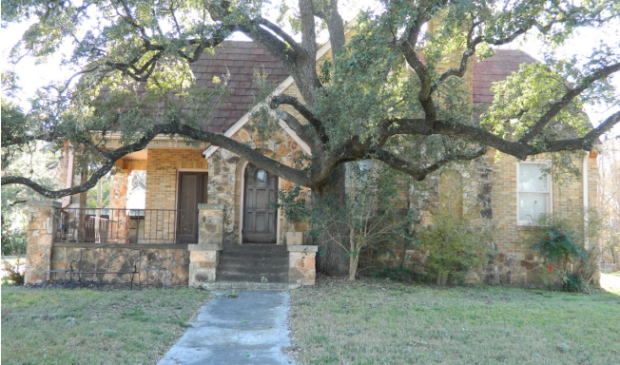Council denies landmark designation for Lightsey-Russell House
Monday, August 17, 2015 by
Jack Craver The yellow-clad neighbors who came out to urge preservation of the Lightsey-Russell House struck a chord with City Council, but not one strong enough to save the 83-year-old home at 1805 Lightsey Road from demolition.
With a seemingly heavy heart, Mayor Steve Adler and four other Council members cast votes denying a petition by neighbors to designate the South Austin house a historical landmark. Five other Council members voted for the designation, while one abstained. Because the current property owner opposed the landmark designation, the motion required a supermajority to be approved. Council Members Don Zimmerman, Ellen Troxclair, Pio Renteria and Ora Houston voted with the mayor to deny historical landmark designation.
“This is a hard one,” said Adler, shortly before the vote was taken. “I am convinced beyond a shadow of a doubt that this is a significant house. It’s a significant house to the neighborhood in so many ways. The test we have to define, though, isn’t whether it’s a significant house, but whether it’s historical, as that falls under the statute.”
Adler said he was certain that the house fulfilled only one of the five criteria for landmark status, as specified by city ordinance. To qualify, buildings are supposed to fulfill at least two of the criteria.
While he believed the house was of “community value,” as demonstrated by the 270 people who signed a petition to preserve it, Adler was not convinced that the house was particularly significant architecturally or that it was associated with very important historical figures or events.
Adler was also troubled by the fact that the city’s historic preservation officer, Steve Sadowsky, had not recommended the house for landmark designation.
Advocates for preserving the house had argued that it was rendered historically significant by its first occupants, Charles and Veda Lightsey, who founded a taxi service and what was perhaps Austin’s first rental car service. They later got involved in the liquor trade and used the former cabs to deliver booze.
The property is currently owned by PSW Real Estate, which plans to demolish the home to make way for three new houses. In fighting the landmark designation, representatives from PSW argued that the house was not historically important enough to merit landmark status.
It also emphasized that the new houses would be much cheaper than the existing one and that the group had worked hard to preserve heritage trees on the property that neighbors wanted to protect.
Council Member Ann Kitchen, in whose district the property is located, was Council’s most outspoken advocate for preserving the house, saying it was important to safeguard remnants of Austin’s past in the midst of dramatic change.
“We have a neighborhood that’s been destroyed,” she said. “It was a neighborhood of large lots that has been subdivided over and over again. This is simply asking for one house in that neighborhood to be preserved, and if that’s not community value, I don’t know what is.”
Mayor Pro Tem Kathie Tovo also supported preserving the house, telling colleagues that they should go see the home for themselves to understand its value.
Council Member Leslie Pool challenged PSW over its contention that the homes it will build in Lightsey’s stead will be affordable. The developers have suggested that the homes would cost between $350,000 and $400,000.
“If you’re going to say they’re affordable, I would just ask affordable to whom,” Pool said. “I don’t think I could afford to buy a $400,000 home.”
Council Member Delia Garza, following Pool, said that affordability was irrelevant to whether a house merited landmark status. Garza also expressed skepticism about the house’s historic value. She suggested that the process for determining a building’s historical significance likely over-represented some aspects of Austin’s past while neglecting the history associated with marginalized groups who had even less power in the past.
And yet, Garza said she would defer to the city’s Historic Landmark Commission, which had unanimously voted to preserve the house.
Zimmerman and Troxclair, Council’s most conservative members, both voiced distaste for designating a house as a landmark over the objections of the property owner. Zimmerman repeatedly expressed disbelief that such a practice was allowed and criticized the manner in which city government makes such decisions, saying it was arbitrary and subjective.
As he has done in the past, Zimmerman invoked both his own experiences and Texas history in explaining his fear of too much government power.
“I grew up in San Antonio, the Alamo city,” he said. “People died in that Alamo because of subjective government. We had bureaucrats from the Mexican government who would issue decrees based on nothing but their opinion. So the subjective part of government is something very personal to me.”
Furthermore, said Zimmerman, an engineer by trade, “There’s really nothing extraordinary about this particular house. I don’t have to walk by it. I’ve seen 100 of these.”
Council Member Sheri Gallo tried throughout the hearing to explore possible compromises between the developers and the neighbors, even asking if the house could be moved to another spot on the lot to allow the construction of the new homes. After being told that it wasn’t possible, she announced she would abstain from a vote for the first time in her short tenure on Council.
Photo courtesy of the city of Austin.
You're a community leader
And we’re honored you look to us for serious, in-depth news. You know a strong community needs local and dedicated watchdog reporting. We’re here for you and that won’t change. Now will you take the powerful next step and support our nonprofit news organization?









